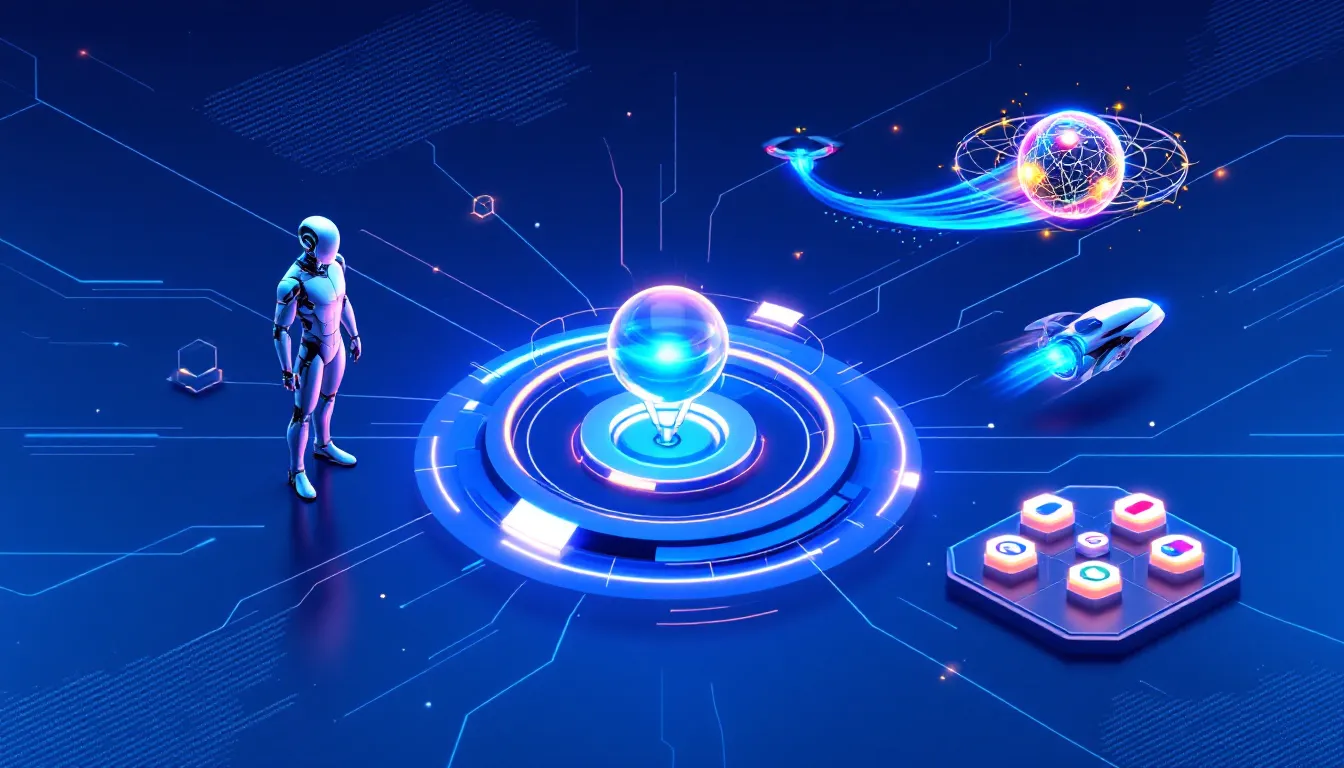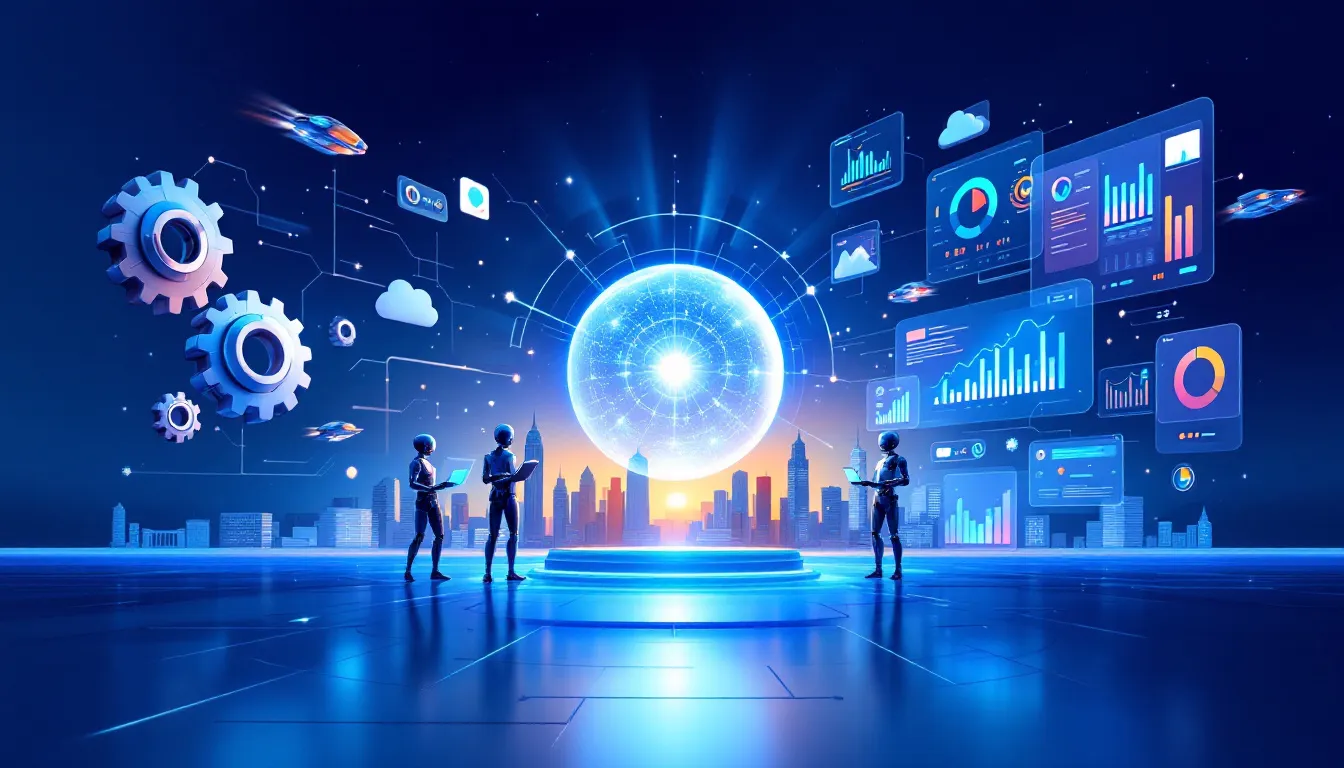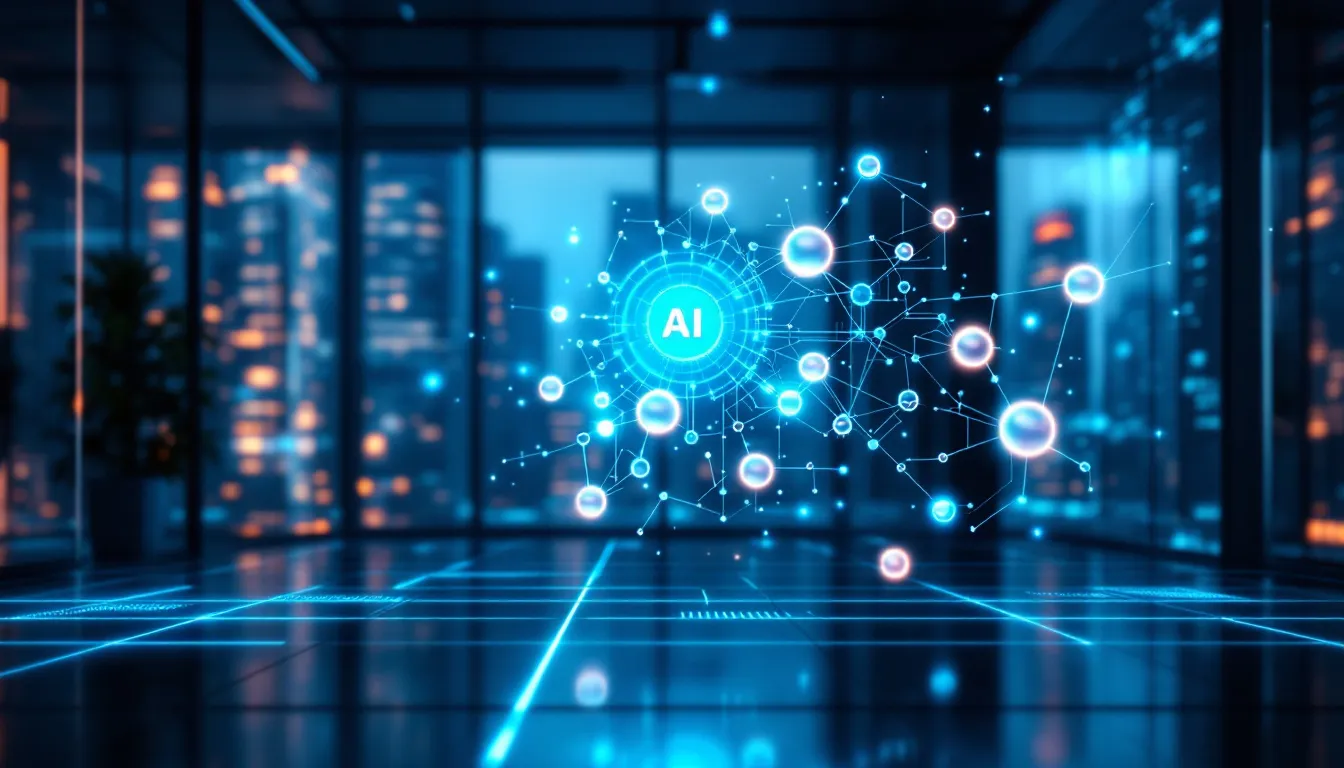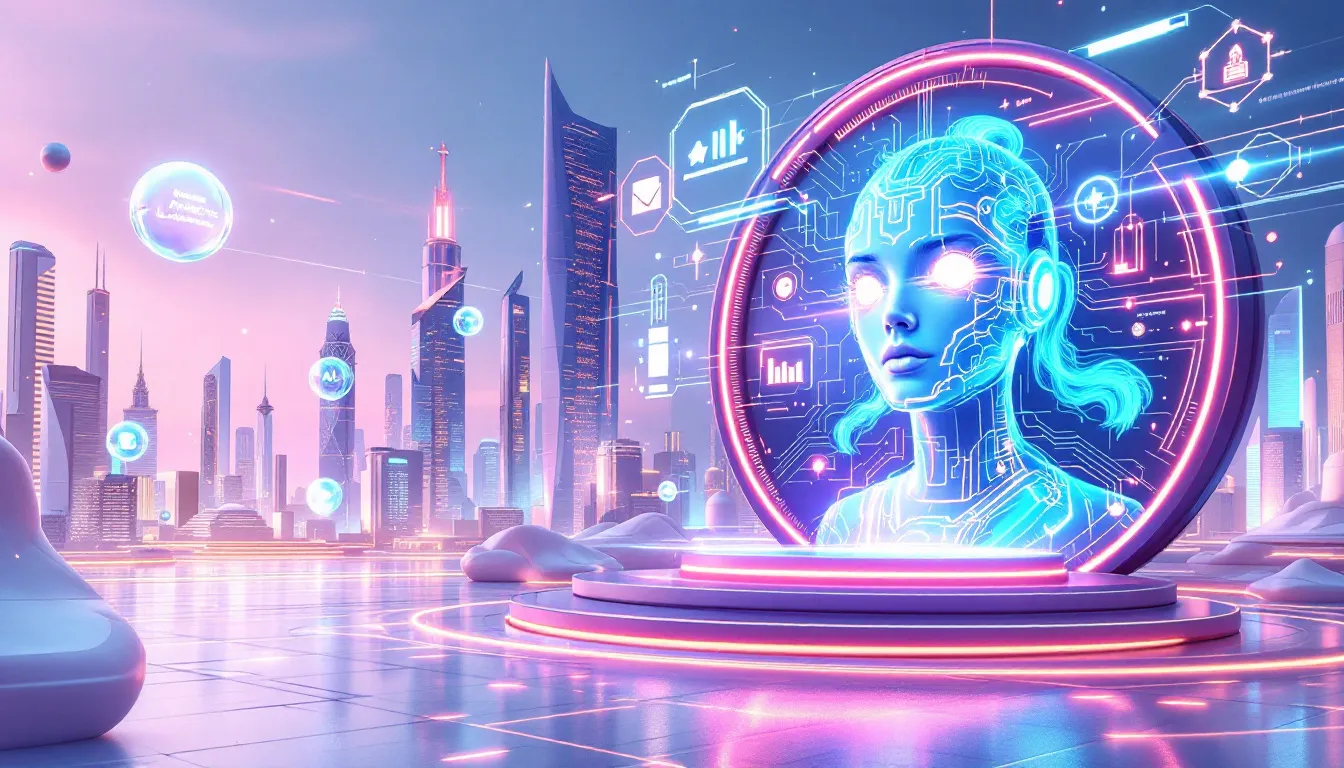AI Agents for Business: Transformative Tools to Elevate Your Operations
AI agents for business automate tasks, enhance decision-making, and improve efficiency. Unlike traditional automation, AI agents learn and adapt, making them ideal for dynamic business environments. This article explains what AI agents are, their key components, and the benefits they offer to various business functions.
Key Takeaways
- AI agents are adaptive tools that enhance business efficiency by learning from their environment and improving their performance over time.
- They operate autonomously in various capacities, including customer service, data management, and security, allowing teams to focus on high-value tasks.
- Implementing AI agents requires a strategic approach, emphasizing the definition of objectives, proper tech integration, and ongoing performance monitoring.
Understanding AI Agents

AI agents are at the forefront of technological innovation, offering a fresh perspective on how businesses can operate more efficiently. Unlike traditional automation, which focuses on repetitive and predictable tasks, artificial intelligence agents are designed to perceive their surroundings and make decisions independently to reach specific objectives. This capability to adapt and learn enables ai agents and intelligent agents to stand apart from static automation systems that follow set rules without deviation. Additionally, using an ai tool can enhance the effectiveness of these agents. The ai agent builder further streamlines this process.
What truly makes AI agents revolutionary is their ability to continuously improve their performance through learning. Traditional systems remain static, but AI agents evolve, enhancing their decision-making processes over time. This means that the more they operate, the smarter they become, leading to ever-increasing efficiency and effectiveness in achieving their goals.
Another key feature of AI agents is their interaction capability. They can engage with users or other systems to solve problems dynamically, making them invaluable in complex and ever-changing environments. Whether it’s handling customer inquiries, processing data, or managing security threats, AI agents work independently and possess specific expertise to tackle these tasks head-on. This adaptability and intelligence make them indispensable tools in the modern business landscape.
How AI Agents Work
The magic behind AI agents lies in their sophisticated operational cycle:
- Observe: The AI agent observes its environment by collecting and analyzing data from various sources.
- Plan: This data forms the foundation upon which the agent plans its actions.
- Act: The agent then executes the planned actions.
The planning phase is where AI agents truly shine, utilizing large language models to interpret data, reasoning models, and decide on the best course of action. Once a plan is in place, AI agents proceed to act autonomously. This means they can execute tasks without requiring constant human intervention, making decisions on the fly and adapting to new information as it becomes available.
Imagine having an AI agent that can manage your email, schedule meetings, or even handle customer inquiries—all while you focus on higher-value work that provides real value and real business results. This AI agent can automate workflows and is a game changer. With this tool, you can streamline your tasks efficiently using copilot studio.
The continuous improvement aspect of AI agents cannot be overstated. As they perform tasks, they learn from each action, refining their processes and becoming more efficient over time. This self-improving nature ensures that AI agents remain relevant and effective, providing long-term value to businesses that deploy them.
Core Components of AI Agents
AI agents are built on several core components that enable them to function effectively in various business contexts. The first component is data processing, where AI agents can handle both structured and unstructured data, including:
- Documents
- Spreadsheets
- Chat conversations
- Emails By processing these diverse data types, AI agents gain the context needed for their tasks.
Natural language processing (NLP) is another critical component. NLP allows AI agents to understand and interpret human language, making it possible for them to engage with users and respond to queries accurately. This capability is particularly important for conversational AI agents, which need to interact seamlessly with customers and employees.
External systems integration is the final piece of the puzzle. AI agents must be able to access and utilize external data from various sources to perform their tasks effectively. This integration allows them to pull information from different systems, analyze it, and make informed decisions. Whether it’s accessing a CRM system for customer data or integrating with security systems to monitor threats, this capability ensures that AI agents can adapt to a wide range of business needs.
Types of AI Agents for Business

AI agents come in various forms, each designed to address specific business needs. Conversational AI agents, for example, are designed to:
- Engage with users and manage customer service inquiries.
- Be available around the clock, providing immediate responses and enhancing customer satisfaction.
- Handle everything from answering common questions to troubleshooting issues, freeing up human agents for more complex tasks.
Security agents play a crucial role in protecting sensitive information. These AI agents monitor systems for anomalies and potential threats, ensuring that any suspicious activity is detected and addressed promptly. By automating the monitoring process, businesses can enhance their security measures without the need for constant human oversight.
Data agents are another vital type of AI agent. They automate data processing and analytics, enabling rapid decision-making based on large data sources. This capability is particularly useful for businesses that need to process vast amounts of information quickly and accurately.
Different types of agents and other agents assist various teams in the following ways:
- Creative agents generate content that adheres to brand guidelines, assisting marketing teams.
- Employee agents streamline HR and administrative tasks, allowing staff to focus on strategic work.
- Code agents help developers by automating routine coding tasks, improving efficiency in software development, and using ai agents to help enhance productivity.
Benefits of AI Agents in Business Operations

The benefits of AI agents in business operations are numerous and far-reaching, including:
- Acceleration of business processes
- Streamlining operations to complete tasks more quickly and efficiently
- Enhancing speed and efficiency, leading to significant productivity improvements that contribute to overall business value
- Unlocking the potential for new business models
Another major benefit is cost reduction. AI agents can significantly reduce costs by automating tasks that would traditionally require human input. This efficiency allows organizations to allocate resources more effectively, focusing on strategic initiatives rather than routine tasks. Moreover, AI agents enhance operational resilience by quickly adapting to changing business requirements and market conditions.
Additionally, AI agents free up employees, enabling employees to focus on more strategic and creative work. Instead of being bogged down by repetitive tasks, employees can dedicate their time to activities that require human ingenuity and problem-solving skills. This shift not only improves employee satisfaction but also drives innovation and growth within the organization.
Real-World Applications of AI Agents

AI agents are making a significant impact across various industries, with real-world applications that demonstrate their value. In marketing, AI agents:
- Optimize global campaigns, reducing the need for extensive analyst involvement
- Ensure that marketing efforts are both targeted and effective
- Analyze consumer data
- Identify trends
- Adjust strategies in real-time, maximizing the return on marketing investments.
In customer service, AI agents automate ticket resolution, identify customer intent, and provide immediate responses to inquiries on the customer service side. This automation not only improves response times but also enhances customer satisfaction by ensuring that issues are resolved quickly and efficiently. AI agents also optimize customer relationship management by automatically logging customer interactions, updating deal statuses, and handling lead information, including addressing customer questions.
Social media interactions are another area where AI agents excel. They monitor brand mentions, respond to customer inquiries in real-time, and even manage social media accounts. This capability allows businesses to maintain a strong online presence and engage with their audience effectively.
Additionally, AI agents assist in meeting scheduling by checking availability, proposing optimal times, and automatically sending invitations. They can also summarize documents, extracting key information from lengthy texts to facilitate quicker information sharing.
Implementing AI Agents in Your Business
Implementing AI agents in your business requires a strategic approach. The first step is to clearly define the objectives of your AI agents, focusing on the specific problems they will solve. This clarity ensures that the AI agents are tailored to meet the unique needs of your business. Conducting AI opportunity assessments can help identify areas where AI implementation will create the most value.
Choosing the right tech stack is crucial for successful implementation. This includes:
- Selecting the appropriate programming languages, AI frameworks, and automation tools that align with your use case.
- Ensuring high-quality, relevant data for training AI agents, encompassing both structured and unstructured formats.
- Conducting multiple training iterations to enhance the accuracy and functionality of the AI model.
Integrating the trained ai models into existing workflows is vital for automating repetitive tasks like email management and customer support. Rigorous testing and follow ups are essential to ensure accuracy in deploying ai agents to perform their designated tasks effectively and securely before deployment.
Key considerations for AI initiatives include:
- Monitoring performance metrics, such as response time and user satisfaction, after deployment to maintain the AI agent’s effectiveness.
- Building internal capabilities and AI literacy within the organization for long-term success.
- Starting with focused pilot projects to help manage risk while advancing AI initiatives.
Risk Management and Responsible AI
Risk management and responsible AI deployment are critical aspects of integrating AI agents into business operations. Key points include:
- Addressing data privacy and ethical concerns to ensure compliance and build trust.
- Utilizing the NIST AI Risk Management Framework (AI RMF) to manage AI-related risks and enhance the trustworthiness of AI systems.
- The framework was developed through a collaborative process involving public input and multiple workshops.
A dedicated resource center launched by NIST supports the implementation of the AI RMF and promotes global alignment, ensuring that AI systems are developed and deployed responsibly. The AI RMF includes a profile specifically for generative AI, addressing unique risks and recommending management actions to ensure reliable results and issue resolution.
Future Trends in AI Agents

The future of AI agents is filled with exciting possibilities. Emerging AI agents will operate with increased autonomy, allowing them to perform complex tasks independently. In the near future, next-generation AI agents will have enhanced reasoning capabilities, enabling them to understand causal relationships rather than just patterns. This advancement will make AI agents even more effective in solving complex problems.
Emotional intelligence is another area where AI agents are expected to improve. Future AI agents will be able to detect and respond to human emotions more effectively, enhancing their interactions with users. These agents will also work collaboratively with humans and other AI systems, rather than functioning in isolation.
Multimodal capabilities will enable next-generation AI agents to incorporate new technologies and new capabilities to:
- Process and generate data across various formats, such as text, voice, images, and video.
- Integrate with augmented and virtual reality technologies to transform training and customer service experiences.
- Utilize the rise of 5G and advanced connectivity to support real-time AI applications with higher bandwidth and lower latency.
Ethical considerations regarding AI accountability and fairness will grow in importance as AI agents take on more significant roles. Combining AI agents with blockchain technology can improve transparency and trust through self-executing contracts. Regulatory developments will shape the landscape for AI agents, promoting trust and stability in their adoption.
Summary
In summary, AI agents are transformative tools that offer immense potential to elevate business operations. Their ability to automate tasks, make intelligent decisions, and continuously improve makes them invaluable assets in today’s competitive landscape. By understanding how AI agents work, recognizing their benefits, and implementing them responsibly, businesses can unlock new opportunities for growth and innovation.
As we look to the future, the continued evolution of AI agents promises even greater advancements. From increased autonomy and enhanced reasoning capabilities to improved emotional intelligence and multimodal functions, AI agents will continue to reshape the business world. Embracing these technologies and fostering a culture of continuous learning will ensure that businesses remain competitive and proactive in the face of rapid technological change.
Frequently Asked Questions
What are AI agents, and how do they differ from traditional automation?
AI agents are smart systems that can perceive their environment and make decisions on their own, setting them apart from traditional automation, which is limited to predictable tasks. The key difference is that AI agents adapt and learn, enhancing their performance over time.
How do AI agents work?
AI agents work by observing their environment, planning actions based on data analysis, and then acting on those plans, all with minimal human help. They continuously learn from their experiences to improve their performance.
What are the core components of AI agents?
The core components of AI agents are data processing, natural language processing, and integration with external systems. These elements work together to enable the AI to understand and act on information effectively.
What are the benefits of implementing AI agents in business operations?
Implementing AI agents can significantly boost your business by speeding up processes and cutting costs, while also freeing up your team to tackle more strategic tasks. Plus, they can enhance productivity and pave the way for innovative business models.
What are some real-world applications of AI agents?
AI agents are super useful in areas like marketing and customer service, helping with everything from managing social media to automating ticket resolutions. They really streamline processes and improve efficiency across the board.
